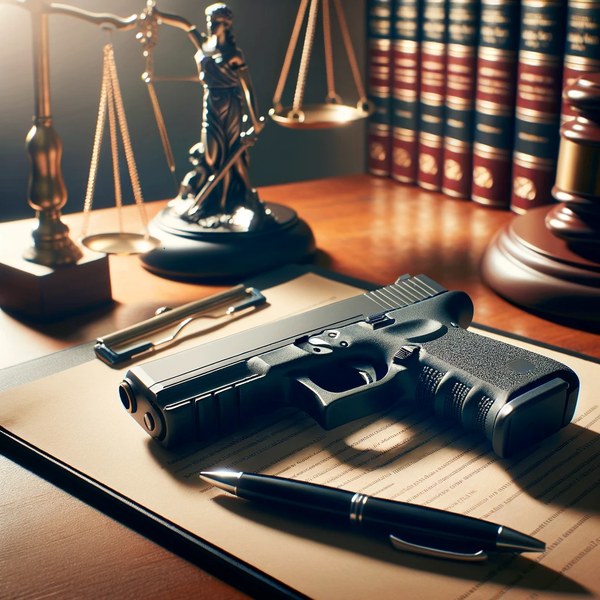What Can I Do with a Gun Trust?

Are you aware that in the year 2016, Stewart County, Tennessee, was rated number one in the top 20 most armed counties in the country? Yes- indeed! Stewart County, which includes the towns of Dover, Indian Mound, Bumpus Mills, and Cumberland City, has the highest percentage of residents who keep firearms around their homes.
Considering a Gun Trust
With numerous firearms in your possession, you may be considering whether you should explore a Gun Trust.
This article is a brief summary of some benefits of a Gun Trust.
Acquire and Possess Rifles, Pistols, and Shotgun (Non-NFA or GCA) Firearms
A trust is not a person under Title I of the Gun Control Act so that no background check can be performed at an FFL for a direct purchase by a trust or trustee. This is different from an NFA firearm under Title II. However, your trust can acquire non-NFA firearms directly from a private party if no FFL or background check is required, and it can possess firearms lawfully transferred to it with an assignment or bill of sale.
State law governs the requirements for firearm possession and transfer.
Acquire and Possess NFA Items
Prior to July 13, 2016, using a trust expedited the process of purchasing NFA firearms like silencers. Federal law, effective July 13, 2016, requires each “Responsible Person” to provide documentation (Form 23) when filing an application to make (Form 1) or transfer (Form 4 or 5) an NFA Firearm. This requires you (Grantor), each serving Trustee, and anyone having specific power or authority over the trust and trust property to provide a copy of Form 23 to the local Chief Law Enforcement Officer (CLEO) as notification. The application (Form 1, 4, or 5) and all required documentation (Form 23, fingerprints, photographs) and payment are submitted to the NFA Branch. The NFA Branch conducts a background check as part of your application.
Check out www.atf.gov/firearms or contact our office for more information.
Lawfully “Share” Your Firearms
The trust provides information about the lifetime enjoyment of trust firearms, which can be complicated under federal and state law. Generally, though, your Gun Trust is a superior way to acquire and possess firearms and accessories. Sharing them with some protection against the commission of an “accidental felony.” This is our catchphrase to describe an unlawful transfer made resulting in unlawful possession and transfer of a firearm. You and the other person truly believed you were acting lawfully.
Why Is a Gun Trust Useful?
You can document why someone other than you is in possession of your firearm! Both federal and state laws can make it criminal for another person to possess your firearm. Title I firearms have different requirements than Title II firearms, and each state may also have its own requirements.
Several states, such as Washington, Oregon, and Colorado, are prime examples of transfer laws that can be surprising to gun owners. These and other states impose criminal penalties for transferring a firearm between persons absent a background check or a statutory exclusion or exception.
Guidelines for Firearm Trust Beneficiaries
A Gun Trust includes specific language about trust beneficiaries, which refers to individuals entitled to enjoy trust assets and benefits. Understanding how these beneficiaries can interact with the trust is crucial to ensuring compliance with firearm laws.
Lifetime Beneficiaries and Trustee Authority
A Lifetime Beneficiary is someone you designate to enjoy trust assets while you are alive, under the authority of a Trustee. The Trustee has the legal power to possess firearms for the benefit of the beneficiary.
For NFA firearms, a Trustee must always maintain actual or constructive possession of the firearm. The trust legally owns the firearm, and only a Trustee can possess it.
While a non-NFA firearm might be transferable to a beneficiary for individual possession, this approach can create legal risks. The best practice is for a Trustee to maintain constructive or actual possession at all times, especially if the beneficiary is not also an appointed Trustee.
Appointing and Removing Lifetime Beneficiaries
A Gun Trust portfolio typically includes forms that allow you to appoint or remove individuals in various roles. You can formally designate someone as a Lifetime Beneficiary, meaning they are only entitled to benefit from the trust during your lifetime.
A Lifetime Beneficiary does not automatically inherit trust assets after your death. Unless they are also named as a Remainder Beneficiary or are specifically designated in your Firearms and Accessories Memorandum. Additionally, a Lifetime Beneficiary cannot independently possess a trust firearm unless a Trustee is present.
Inclusive Language for Shared Use
The trust also includes inclusive language that allows certain individuals to enjoy trust property during their lifetime. This is particularly important in social situations where firearms are commonly shared.
Understanding State and Federal Firearm Laws
Gun Trusts must comply with both state and federal laws regarding firearm possession and transfer. These laws define key terms such as possession, transfer, and person, which may impact how trust firearms can be shared or distributed.
If a conflict arises between the terms of your Gun Trust and applicable firearm laws, the law will always take precedence over the trust language. Therefore, it is essential to understand these legal definitions and ensure your trust aligns with regulations.
Make Specific Gifts of Firearms to Individuals
The trust allows you to distribute your firearms by using a written memorandum. The Firearms and Accessories Memorandum (a customized personal property memorandum) allows you to designate a beneficiary of a specific firearm or accessory.
Avoid Probate and Publicity of Your Firearms
The Gun Trust protects your firearms from going through the probate process, a court proceeding to administer a deceased person’s assets. If you have a will or if you have no estate planning documents in place, a probate may result. Remember, probate can make your guns and other assets publicly available, so you may want to use your trust to bypass it. Your Gun Trust helps you to pass on your firearms to those you want to have and enjoy them.
Protect, Preserve, and Pass On Your Firearms Legacy
Legacy planning starts with planning for your own needs first. Then you plan for the needs of others. In this way, you can effectively make a difference. We help others best when we are on a solid personal footing.
It is clear that firearms are an important part of your life. A Gun Trust is a written plan to help you and those you care about lawfully enjoy your firearms during your lifetime. When it is time to pass on, though, the memories you created can be passed on, honored, and continued by those you select to receive your firearms.
Seven out of ten Americans have no estate plan for their assets, and a Gun Trust is one piece of a greater whole. Planning for your firearms is a way to protect, preserve, and pass on something that is important to you. But remember, if you have no estate plan for other assets or if you have a will-based plan, a public probate is likely to occur.
Need Assistance?
Contact us if we may be of further service to you.
Firearm Laws, Gun Trust, Legal Services, Olivia Wann Law, Tennessee, Tennessee Law

